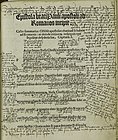Early writings of the Reformation movement
The early writings of the Reformation movement , initiated by Martin Luther , are a group of 14 manuscripts and original prints from the 16th century that were included in the world document heritage in Germany in 2015 .
The selected writings are intended to illustrate in an exemplary manner how a religious, church-critical impulse developed further and led to political and social changes. At the same time, they also represent the transition from manuscripts to print media , a technical advance that contributed significantly to the spread of the Reformation . They illustrate the different ways in which Martin Luther made his concerns known to the public ( Martin Luther and the print media ). With the Reformation, new forms of popular piety emerged , education was modernized, and the vernacular gained importance.
The Leibniz Institute for European History in Mainz selected the nominated documents in cooperation with Luther and Reformation researchers from all over the world.
| image | place | Library or archive | signature | document | description |
|---|---|---|---|---|---|

|
Wolfenbüttel | Herzog-August-Bibliothek | Codex Guelferbytanus 71.4 Theol. 4 ° | Wolfenbüttel Psalter | Together with the Scholienheft, the Wolfenbüttel Psalter stands for the beginning of Luther's activity as a professor. |
| Dresden | Saxon State Library - State and University Library | Mscr. Dresden. A 138 | Scholienheft for Luther's lecture on the Psalms 1513/15 | Autograph, prepared for printing by Luther, but which did not materialize. | |

|
Dessau | Anhalt State Library | George 1049a | The student Sigismund Reichenbach 's transcript of Luther's lecture on Romans 1515/16 | The fact that a student transcript was preserved shows that the Roman epistle lecture caused a sensation. |
| Berlin | Berlin State Library - Prussian Cultural Heritage | Inc. 2840 | Luther's personal copy of the printed Hebrew Bible edition Brescia 1494 | This document represents Luther's interest in the Hebrew language and his philological work. | |

|
Berlin | Berlin State Library - Prussian Cultural Heritage | gr. 2 ° Luth. 54 | Poster print of Luther's 95 theses ( Hieronymus Höltzel , Nuremberg 1517) | With the 95 theses, Luther addressed the learned public. |

|
Weimar | Duchess Anna Amalia Library | Auth. Luth. 1518 (9) | "Eynn Sermon of the Ablasz and grace" (Johann Grunenberg, Wittenberg 1518) | This vernacular sermon was Luther's first great journalistic success. It already contains Luther's doctrine of justification in a simple form. |
| Gotha | Gotha Research Library | Theol. 4 ° 00224/08 (08) | " On the freedom of a Christian " (Johann Grunenberg, Wittenberg 1520) | The document is representative of Luther's writings from the year 1520. "With the Freiheitsschrift he achieved a tremendous journalistic success far beyond the territorial and imperial borders of the time." | |
| Weimar | Thuringian Main State Archive, Ernestine General Archive | Reg. E 81 | Handwritten draft by Luther for his speech on April 18, 1521 before the Reichstag in Worms | The manuscript ended up in the electoral archives in Torgau and after the battle of Mühlberg was transferred to Weimar, where it was discovered by archivist August Hugo Burkhardt and published in 1866. | |
| Lutherstadt Wittenberg | Lutherhaus , Luther Memorials Foundation in Saxony-Anhalt | I 5/1387 | Autograph letter from Luther to Emperor Charles V (April 28, 1521) | In this letter, Luther looked back on his hearing at the Worms Reichstag. | |

|
Wolfenbüttel | Herzog-August-Bibliothek | Bible-S. 4 ° 257 | "The Newe Testament Deutzsch" ( Melchior Lotter , Wittenberg 1522) | The September Testament was the corrected version of the translation of the New Testament that Luther had made at the Wartburg. |

|
Weimar | Duchess Anna Amalia Library | Cl I: 58 (b) and (c) | Weimar Luther Bible from 1534 : “Biblia that is the entire Holy Scripture in German. Mart. Luth., Wittenberg "( Hans Lufft , Wittenberg 1534) | |
| Heidelberg | Heidelberg University Library | Cod. Pal. Germ. 793 | Song single-sheet print " Well rejoice, dear Christians gmein " ( Philipp Ulhart , Augsburg 1524) | Singing Reformation songs was a practice used to acquire Reformation content. | |
| Worms | Worms City Library | Mag-LB 181 | "To the riders of all cities in Germany: that they should set up and echo Christian schools" (Lukas Cranach, Christian Döring, Wittenberg 1524) | With the councilor's pamphlet, Luther called on the political authorities to take responsibility for the education of young people. | |

|
Jena | Thuringian University and State Library | 4 bud. Var. 635 (8) | "German Mass vnd ordnung Gottis diensts" (Melchior Lotter, Wittenberg 1526) | Luther's German Mass , which came into being relatively late, was intended to encourage the community to participate actively and comprehensively in the service. |
Web links
- Nomination form. International Memory of the World Register: Documents representing the beginning and the early development of the Reformation initiated by Martin Luther
- German UNESCO Commission: Milestones of the Reformation
literature
- Irene Dingel , Henning P. Juergens: Milestones of the Reformation. Key documents of Martin Luther's early effectiveness . Gütersloh 2014, ISBN 978-3-579-08170-0 .
Individual evidence
- ↑ Irene Dingel, Henning P. Jürgens: Milestones of the Reformation , Gütersloh 2014, p. 14.
- ^ Frank Aurich, Thomas Haffner: UNESCO selects early Luther sources. In: BIS - The magazine of the libraries in Saxony [2O15] No. 3. Accessed on June 25, 2019 .
- ↑ Irene Dingel, Henning P. Jürgens: Milestones of the Reformation , Gütersloh 2014, p. 14 f.
- ↑ Irene Dingel, Henning P. Jürgens: Milestones of the Reformation , Gütersloh 2014, p. 15.
- ↑ Irene Dingel, Henning P. Jürgens: Milestones of the Reformation , Gütersloh 2014, p. 143.
